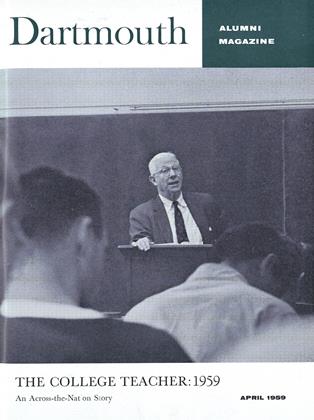I'VE ALWAYS FOUND IT SOMEWHAT HARD TOSAY JUST WHY I CHOSE TO BE A PROFESSOR.
There are many reasons, not all of them tangible things which can be pulled out and explained. I still hear people say, "Those who can, do; those who can't, teach." But there are many teachers who can. They are teachers because they have more than the usual desire to communicate. They are excited enough about something to want to tell others, have others love it as they love it, tell people the how of something, and the why.
I like to see students who will carry the intellectual spark into the world beyond my time. And I like to think that maybe I have something to do with this.
THERE IS A CERTAIN FREEDOMIN THIS JOB, TOO.
A professor doesn't punch a time clock. He is allowed the responsibility of planning his own time and activities. This freedom of movement provides something very valuable—time to think and consider.
I've always had the freedom to teach what I believe to be true. I have never been interfered with in what I wanted to say—either in the small college or in the large university. I know there have been and are infringements on academic freedom. But they've never happened to me.
I LIKE YOUNG PEOPLE.I REGARD MYSELF AS YOUNG.
I'm still eager about many of the things I was eager about as a young man. It is gratifying to see bright young men and women excited and enthusiastic about scholarship. There are times when I feel that I'm only an old worn boulder in the never-ending stream of students. There are times when I want to flee, when I look ahead to a quieter life of contemplation, of reading things I've always wanted to read. Then a brilliant and likeable human being comes along, whom I feel l can help—and this makes it all the more worthwhile. When I see a young teacher get a start, I get a vicarious feeling of beginning again.
AND THERE IS THISMATTER OF "STATUS."
Terms like "egghead" tend to suggest that the intellectual is something like a toadstool—almost physically different from everyone else. America is obsessed with stereotypes. There is a whole spectrum of personalities in education, all individuals. The notion that the intellectual is somebody totally removed from what human beings are supposed to be is absurd.
PEOPLE ASK ME ABOUT THE"DRAWBACKS" IN TEACHING.
I find it difficult to be glib about this. There are major problems to be faced. There is this business of salaries, of status and dignity, of anti-intellectualism, of too much to do in too little time. But these are problems, not drawbacks. A teacher doesn't become a teacher in spite of them, but with an awareness that they exist and need to be solved.
TODAY MAN HAS LESS TIMEALONE THAN ANY MAN BEFORE HIM.
But we are here for only a limited time, and I would rather spend such time as I have thinking about the meaning of the universe and the purpose of man, than doing something else. I've spent hours in libraries and on park benches, escaping long enough to do a little thinking. I can be found occasionally sitting out there with sparrows perching on me, almost.
THE CIRCUMSTANCE is a strange one. In recent years Americans have spent more money on the trappings of higher education than ever before in history. More parents than ever have set their sights on a college education for their children. More buildings than ever have been put up to accommodate the crowds. But in the midst of this national preoccupation with higher education, the indispensable element in education—the teacher—somehow has been overlooked. The results are unfortunate—not only for college teachers, but for college teaching as well, and for all whose lives it touches. If allowed to persist, present conditions could lead to so serious a decline in the excellence of higher education that we would require generations to recover from it. Among educators, the problem is the subject of current concern and debate and experiment. What is missing, and urgently needed, is full public awareness of the problem—and full public support of measures to deal with it.
HERE is A TASK for the college alumnus and alumna. No one knows the value of higher education better than the educated. No one is better able to take action, and to persuade others to take action, to preserve and increase its value. Will they do it? The outlines of the problem, and some guideposts to action, appear in the pages that follow.
"If I were sitting hereand the whole outside worldwere indifferentwas doing, I wouto be doing just what I am."
"We may always be running just to keepfrom falling behind. But the person whois a teacher because he wants to teach,because he is deeply interested in peopleand scholarship, will pursue it as long ashe can." —LOREN C. EISELEY
 View Full Issue
View Full Issue
More From This Issue
-
 Feature
FeatureSummary of Recommendations
April 1959 -
 Feature
FeatureDARTMOUTH'S ALUMNI RELATIONS
April 1959 -
 Feature
FeatureFuture Action and Planning
April 1959 -
 Article
ArticleWHAT PRICE DEDICATION?
April 1959 -
 Article
ArticleWILL WE RUN OUT OF COLLEGE TEACHERS?
April 1959 -
 Class Notes
Class Notes1943
April 1959 By STANTON B. PRIDDY, LEO SILVERSTEIN JR.
Features
-
 Feature
FeatureCongressional Chronicler
FEBRUARY 1967 -
 Feature
FeatureNoel Perrin Professor of English 2 pigs on a single form
January 1975 -
 Feature
FeatureThe Orioles Are Back
June 1975 By DANA S. LAMB -
 Cover Story
Cover StoryA Man for All Seasons
NOVEMBER • 1985 By Douglas McCreary Greenwood '66 -
 Feature
FeatureForce of Nature
JANUARY | FEBRUARY 2021 By Elizabeth Hoover -
 FEATURE
FEATURESix Hundred Thousands Despots
JANUARY | FEBRUARY 2025 By RAND RICHARDS COOPER







